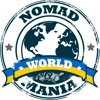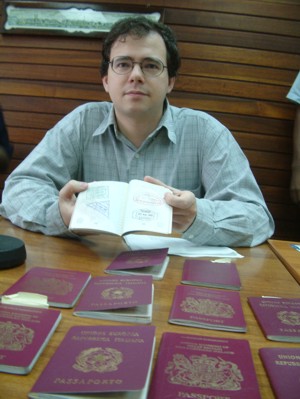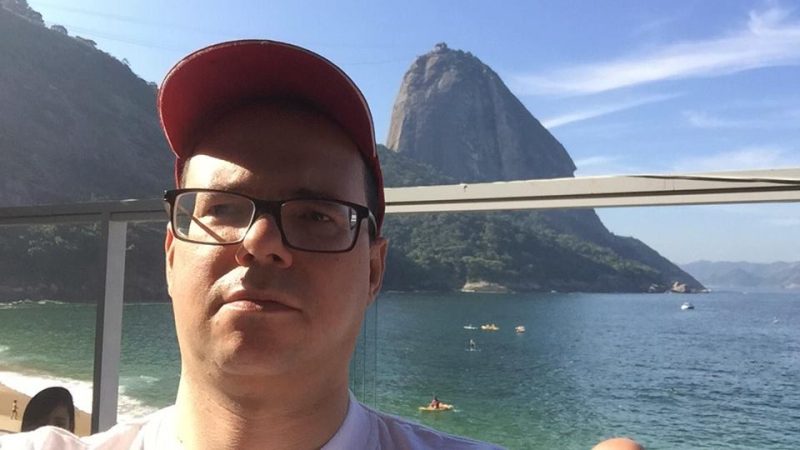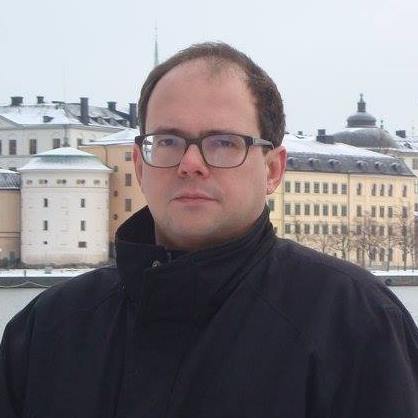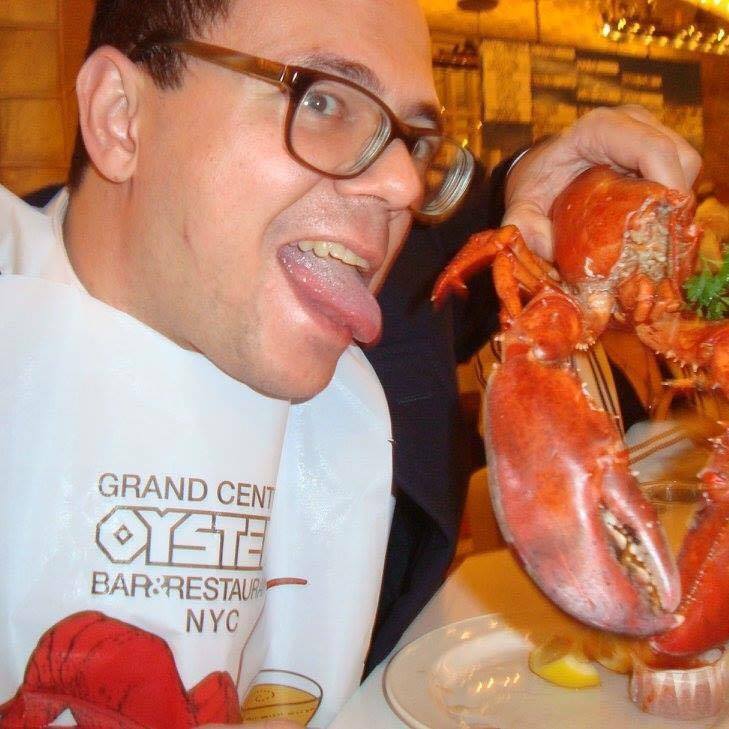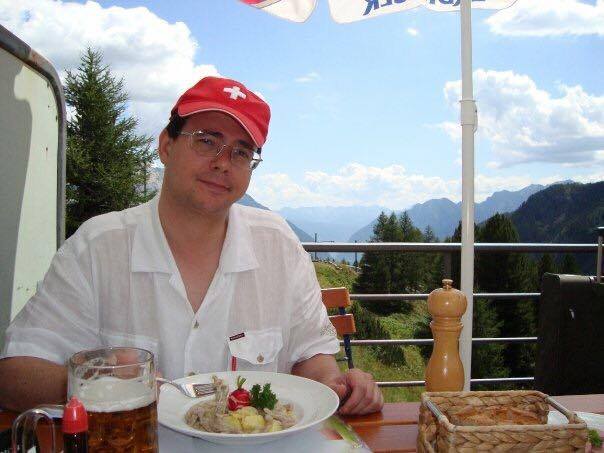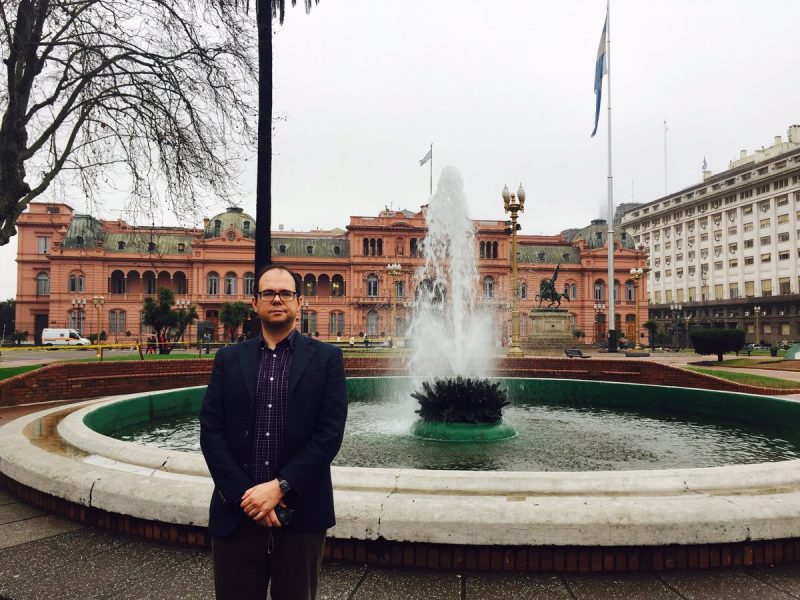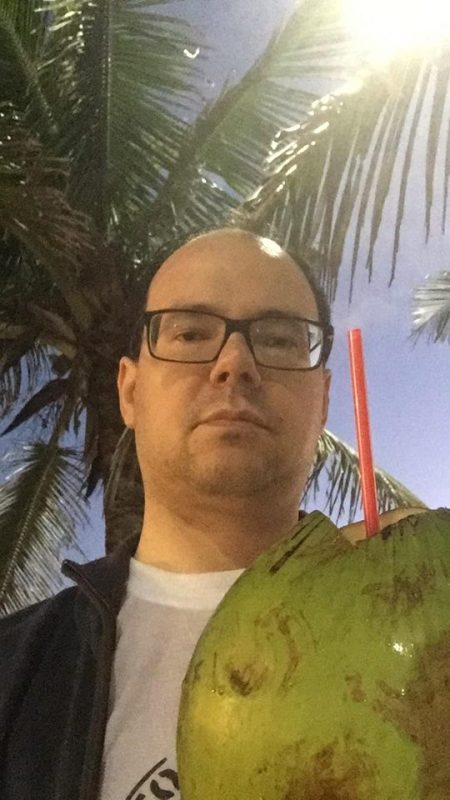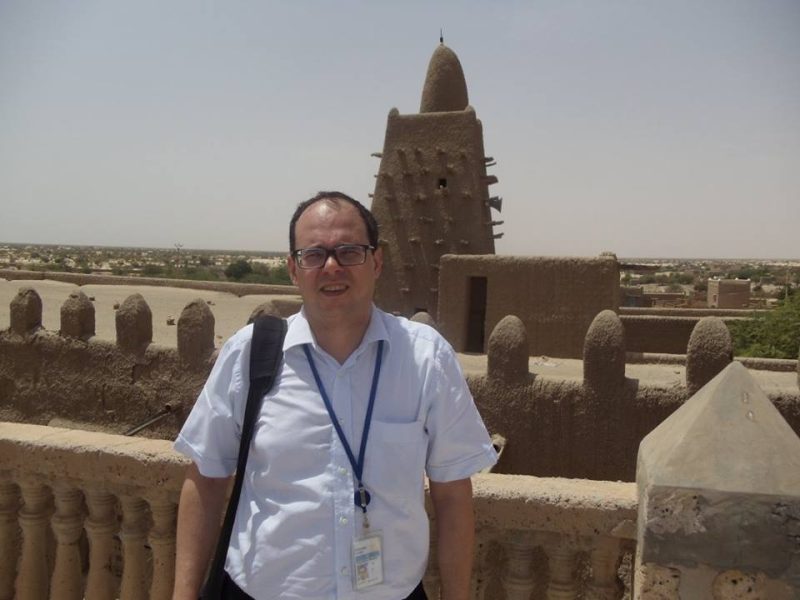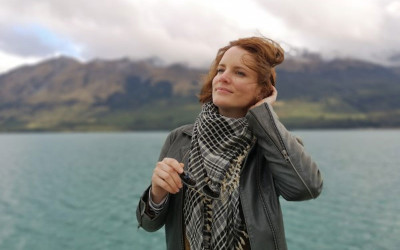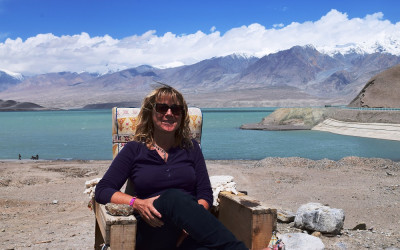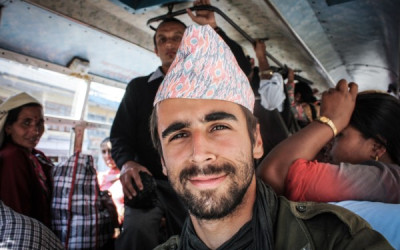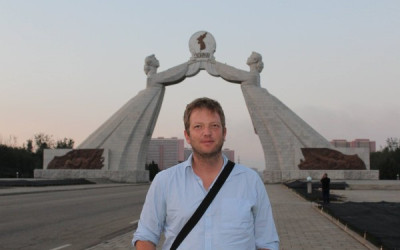Maurizio was the youngest person to have visited every country when he completed his final one – Suriname – in 2004 at the age of 28; the wikipedia entry on him is here.
Maurizio, tell us something about your background and how your interest in travel developed.
I actually come from a very non-international family. Both my parents are Italian, though one of my grandmothers was Austrian and there is apparently some French ancestry in the family too. But from a very young age, I had an inexplicable passion for anything non-Italian. I always loved Italy – I still do of course. But I was always fascinated, perhaps also because I came from a rather non-international family, about what was outside. When I was about six years old and my father bought me a world atlas, apparently I exclaimed “We are just this little thing here ?” and I started wanting to travel.
With my parents I had done the usual stuff you would do from Italy: Switzerland, France, Germany, former Yugoslavia… Also two cruises to the east and then the west Mediterranean for which I am very grateful to my father – and I guess my father liked the idea of being able to travel while still being in an Italian environment, haha – he was happy being surrounded by Italians and I was happy travelling and making friends with the Soviet crew. When I was 12 I travelled to the UK as part of a summer school programme to improve my English, and two years later I decided I wanted to go to school in the UK.
That marked a turning point in my travels and my education. I had decided I wanted to go to a regular school, not a boarding school, which was rather crazy for my parents since I was just 14. But my parents were supportive, my mother came to visit the school, and for one year I lived between host families and bed&breakfasts. It was an interesting time in my life, which I relish a lot. That’s when I became international – English started being my first language. Though I still went to Italian restaurants whenever I could. One year later I thought it had been enough life on my own, and I retuened to Italy, albeit first to a European School and then to a British School where my first language would continue to be English.
From age 14 or so, I did three inter-rail journeys across Europe. At 16 I also travelled to Moscow to see a pen pal – which again sounded crazy but my parents really supported. And once I was 17 and started a gap year between school and university, I went inter-continental and a serious traveller… In that year, 1992, I went to Angola to stay with some Italian priests, where the Italian Embassy was very surprised and worried about a minor, at the time when Italians had to be evacuated because of the conflict – but I managed to evacuate myself to South Africa before this would become a big deal. I spent more time in Southern Africa. I did a couple of months in Mongolia, China, and South-East Asia which I will never forget – Vietnam, Laos and Cambodia were really unspoilt those days and it felt unique to be there. I spent more time in Moscow, where I also learned Russian to a fair extent. The Middle East including Lebanon, where my parents lost track of me and panicked to call the Italian Embassy. And much time in South America which I always loved. Then at 18 it was time for university, and to become more systematic in my travels.
You were the youngest person to finish the UN list at the age of 28, back in 2004. What motivated you back then?
Indeed, a lot of people asked me how I went to so many countries. The thing is, until a certain time I didn’t have it in mind that I would visit every single country. The fact was that I had a passion for being in new countries as much as I could. Albeit some countries may be similar, and even without being able to always spend much time in each of time, there was something special for me in being in a new country (and actually returning to a country as well).
For example, at one point in 1994 during my university years (when I was cleverly doing both my BA and MPhil theses on Cuba – hence more pretexts to travel), I had a spare ten days between Colombia and Cuba. I guess a lot of people would decide to spend ten days on the beach somewhere, or perhaps they would visit one place. Not me. In those ten days, I travelled Bogotá – Panama City – San José – Managua – San Salvador – Tegucigalpa – Guatemala City – Belize City – Cancún – Havana. I was able to spend one day or two in each place. Of course it’s not much to have spent one night in Guatemala, but it’s better than not having been there. Some people would easily do seven cities in seven days, so why not seven countries in seven days ? And by the way, you might be wondering: how much did that cost and how did I have all that money ? Well, I started at a young age to ravel in travel secrets: that whole ticket from Bogotá to Havana and all places in between had cost me just USD 300. This was a clever purchase of a so-called “full IATA fare” (booking class Y), which allows you to stop as much as you want as long as the maximum permitted mileage (MPM) isn’t exceeded by more than 25%. Even the travel agency was very surprised to learn something new – funny.
By the same logic of visiting every possible country even briefly, when in 1998 I was working for Oxfam and going up and down between the UK and East Timor, I felt sad that I had never stopped by in the Indian sub-continent – always flew above it. So I quickly arranged once to fly to Delhi to see some acquaintances, stop in Nepal for one night, two days in Bhutan (wonderful experience – albeit expensive for me back then), one day in Dhaka, and carried on. Or when I had to go from Santiago to Lima once, I found a cheap ticket via Paraguay and spent a day there. Likewise for Iceland: in one of my various travels between Europe and the USA, I just went via Iceland and stopped a couple of days there.
So, all in all, it’s also a sort of addiction to crossing borders – I used this word before. Even these days when I go to Goma in eastern D.R. Congo and my hotel is 500 metres from the border, I can’t resist going to Rwanda for a few hours. Or even in Kinshasa, sometimes I just took a day trip to Brazzaville – I love crossing water, Brazzaville is a quiet city away from bustling Kinshasa, and why not, four passport stamps for my collection.
Only around 2001/2002 when about 30 countries were missing, I thought to myself: wow, maybe I can do them all. I had already passed the hurdles of North Korea (went as a tourist in 2000, although I actually published things as a journalist), Sudan (I went there around 2001 after almost a wait insisting for a tourist visa), Saudi Arabia (I went to Dhahran on a transit visa at some point between Muscat and Bahrain – a transit visa was apparently not hard to obtain back then), etc. So, why not continue ? Some friends and other people I met along the way asked whether I was in for some sort of record, and I wasn’t. But then I thought: why not ?
So I did it. Between 2002 and February 2004 when I completed my record, I did the five countries of Central Asia which I wanted to do anyway and I totally loved, I did the South Pacific which was pricey but surely worth it, and finally I did the Caribbean with an island-hopper ticket which brought me all the way from Puerto Rico down to Suriname – which is the country where I completed my record.
However, you are relatively ‘unknown’ in the greater traveller community, with very little media exposure. How come you have kept such a low profile since?
Well, I did get a good level of attention in Suriname, when I completed my record – as I already had proof that this was an official Guinness attempt. With a background in journalism, I myself organized a press conference through the Ministry of Culture, on 24 February 2004 – four days after completing the record and also the date of my 29th birthday. It was all over the local media, and news and photos also went through Reuters internationally. I remember being interviewed by the BBC, among others, and it was also covered quite well in Italian media including the daily Corriere della Sera. An interview was scheduled with the Daily Telegraph, but somehow Charles Veley offered them an interview at the same time – though he never was in the Guinness and I was – no hard feelings anyway. 🙂
I guess several things explain why my profile went down after that. One, the internet in those times wasn’t what it is today – we didn’t have the myriad of blogs and websites and social media that we have today – otherwise you can be sure that I would have been super active on that.
Two, I completed the record in February 2004, and just after that I had to get serious about getting a real job. Very soon after Suriname, I went to Afghanistan – at that time a hot spot for international organizations and NGOs – to literally knock on doors, and I was very lucky that I managed to find a job (just across the border in Peshawar, to be exact) by May 2004. Until that time I had been a freelance journalist and writer, it was great, but it was more of a pretext to do what I liked including writing and travelling – and it didn’t bring any money in. Besides a couple of short contracts, I was a total freelancer with very little money. I had at some point dreamt of becoming a famous freelance journalist, but there are very few of those – and usually they make it after a career in regular journalism or in some other profession. So, it was time to get a proper job. It was overdue for me to refocus my energies somewhere else.
And third, when Guinness officially recognized by attempt and this was published in 2006, the news was already ‘old’.
Although I have been quite busy since 2004, I have surely endeavoured to be part of the traveller community. I never joined the Travellers Century Club simply for the reason that there is a fee to pay – and I try to avoid that if possible. But by all means, I am a great admirer of the TCC, of the Circumnavigators Club, etc. I might have a different view on how the world should be divided for counting purposes, but I think both clubs are great ways to promote a better world through travel. I am also a member / subscriber of Charles Veley’s Most Traveled People (MTP), and The Best Traveled (TBT) / NomadMania of course, Every Passport Stamp, and many more groups on the web or on social media. By all means, these are all great platforms.
I had my own way of counting the world on my website, but I haven’t had time to maintain my website recently (in case I manage to get it up and running again, it is mauriziogiuliano.org).
You are a dual UK/Italian national. Did this help your travels, and, if so, how?
Actually as explained, I am only Italian by birth. In 1998 I became naturalized as British. I had lived in the UK for at least five years, and I had not been there for the sole or primary purpose of education – since I had first emigrated there in 1989 for school and then I worked in the UK after university. Indeed, I studied at both Oxford and Cambridge, and I feel that those two places are really home to me – they are my alma mater.
But indeed, since that time if not earlier, I feel as much British as I feel Italian (leaving aside the point that I feel a world citizen more than anything else, really). So by age 18 or so, I already thought from the perspective of two different cultures – albeit relatively similar cultures in that. I consider myself a good observer, and since my first trips to the UK at age 12, I was very careful analysing the behaviour of people, how people and societies worked, and differences between Italy and the UK. I therefore suppose that I developed a sort of analytical approach to getting to know a new country (or getting to know your own country for that matter), which I then applied to every new country and culture I got to know.
So indeed, I can say rather proudly, that I feel at home anywhere or almost anywhere in the world. I rarely feel a ‘foreigner’ even though I may be one. Of course, some societies are more open to diversity in culture than others – Brazil versus Mongolia for example. But whatever the situation, I always manage to develop a very good rapport with people – a rapport that prioritizes our common humanity and so many good things about being human, rather than any differences due to culture or language. To me, difference is diversity. Variety is a good thing. If the world were not varied, it would be a very boring place. And I think I am really lucky, if I am able to be part of such variety.
Tell us a couple of travel stories that have really made an impact on you.
When I was 17 and travelled to Mongolia, where I stayed with a pen pal, I then took the Trans-Mongolian railway to the city of Hohhot, in the Inner Mongolia province of China. It was two days of travel across the Gobi Desert with amazing views, sharing the cabin with Mongolian women with whom I could communicate in Russian, and who offered me strange but delicious Mongolian food all the time. I arrived in Hohhot at around midnight, and thought I would arrive to somewhere rather quiet – I was wondering how to get a taxi and so on. Instead I got to a square – the square of the train station – which was bustling with people, with food stands, with street sellers, with sounds and scents of China. It was wonderful. It felt surreal. I finally managed to find a hotel (a rather good find, at USD 30 nightly for a four-star hotel), and in the morning I was woken up by an interesting combination of sounds: a glin-glin sound and music. I looked out of the window, and what did I see from my upper floor hotel room ? It was an eight-lane road, without any cars, but filled with literally thousands of bicycles. And radio speakers were located every hundred metres or so, broadcasting news and music. Wow, I thought to myself: now I am really traveling.
After three wonderful days exploring the sights and sounds and food of this wonderful place, and without seeing a single Caucasian person in three days, I took a flight to Guangzhou and a train to Hong Kong, where I was clearly in a more westernized environment, but was fascinated by this fusion of western and eastern cultures. And from there via Manila (again a nice one-day stopover as one more country), I went to Indochina which was absolutely fabulous. Monasteries spotting the green landscapes, bonzes walking around in sandals, and so little traffic – back then. I did visit those countries later, quite recently, and things have changed so much. I feel lucky having been able to go at that time.
And another one… I believe some websites consider that Tokelau is the remotest places I have been to (alas, Pitcairn is still on my to-do list). Around 2002 or 2003, I remember doing a lot of planning while I was in Fiji, to book the regular ship which travelled between Apia and Tokelau once a month. I was excited for a while before even getting to Apia. And my excitement was at super levels when I boarded this small ship, in the company of several Tokelauans and one doctor from New Zealand. So off we went, to the islands of Fakaofo, Nukunono, and Atafu. During the journey, I mainly had fish caught by the other passengers (I hadn’t really thought of the food aspect). In Fakaofo and Nukunono, we spent about half a day in each. I was busy getting to know the villagers, chatting with them as much as I possibly could, trying to have at least a glimpse of their life in this remote part of the world – three small islands with about 500 inhabitants each. In Nukunono I took part in some sort of island celebration. It was wonderful. And while the focus of my travels is always on people, the scenery was amazing too. And by the way, I also took the time to get all my passport stamped by a very nice female sergeant who took care of immigration, to buy postcards and stamps, and the usual tick-the-box things. In Atafu we arrived at night. Small rowing boats took the other passengers and me from the ship to the shore. Some kind of animals – I would describe them as some sort of maritime cockroaches – were climbing on me – but the villagers were promptly removing them. So, I had no idea where to stay. But with my Lonely Planet guidebook in hand, wow, even in such a remote place this made it. The guidebook said that there was a guesthouse run by a “master fisherman” called Feleti Lopa, and indeed, there he was ! The other passengers helped me wake him up in the middle of the night, and he showed me to the guest room. He offered me some coconuts and bananas – so friendly and welcoming. Amazing time. I can’t wait to go to Pitcairn.
And while as I said people are the focus of my travels, around 2003 I also enjoyed my 24 hours in Antarctica, to where I travelled from Punta Arenas with the Chilean Air Force thanks to a contact. It was to the place which Chile calls “Villa Las Estrellas” on King George Island. As I arrived and I noticed an Italian flag just below the Chilean one, I cluelessly asked whether there was an Italian personality visiting. “It is you”, they replied, and I felt sort of odd – but indeed they took my visit as a tourist / journalist very seriously. In those 24 hours I didn’t sleep at all – it was too exciting to waste time like that. I had lunch with some scientists from Chile, then I went off to explore the three bases located there: one Chilean, one Russian, and one Chinese. The Russian one was almost empty (those were hard times for Russia), though the scientists on duty were very happy to chat with me and to stamp my passport. The Chinese by contrast had some 100 people in a large social room, who offered me great food and tea – and also stamped my passport. The Chileans had a lot more facilities there and I spent time talking to as many people as possible – along with passport stamps and of course postcards. After having a drink with the scientists and military in the local bar, I went off to see the Penguins – I could touch them, wonderful. I took lots of photos of course. During the night I spent time in the airspace control tower, where I learned from the person there – with whom I remained in touch – how he was responsible for controlling the civilian air space over a huge portion of land and water, taking care of flights, for example, that would be around en route between Argentina and Australia. In the morning I had a quick helicopter run to the mainland i.e. the Antarctic Peninsula, and then back to Punta Arenas.
You now work in the humanitarian field, which has taken you to some unusual destinations. Has working in the humanitarian field changed the way you see travel and your priorities when you travel?
I guess the way I see the world and travel, and my priorities, are the same. Whether as a tourist, or as the employee of an NGO or international organization, or as a journalist, or as a local, I believe that travel is a crucial gateway to a better world. I have always believed that. Let’s just think: today most young Germans have friends in the UK, and most young Brits have friends in Germany. These days, as opposed to the 1940s, is it conceivable that the UK and Germany would be at war ? Personally I don’t think so. I think that the more people in one place are close to people in other places, the more likely it is that they will get on – or even better, ideally, that they will value and embrace diversity. Yes, travel is crucial to building a world that is more peaceful, more prosperous, more just.
My work over the past years has indeed been about trying to make the world a better place. It is of course a very ambitious ideal. But whether as travellers, or as people working in a specific domain, I think that we can all make our small difference.
Which countries surprised you, positively or negatively, compared to what you had expected before you went there?
Well, I honestly would say that no countries have surprised me negatively. Of course, some countries have serious problems in terms of crime or even conflict. Some places have very poor infrastructure. But as I always look for the human element, I can’t really say that people in one place or other have negatively surprised me. On the contrary I have been amazed about how, even in the most difficult of circumstances, fellow human beings have shown generosity and support to me during my travels. I have been to remote villages in eastern D.R. Congo or in South Sudan, where locals who had very little would share a meal with me. And on numberless occasions, when visiting dangerous or supposedly dangerous places, I was surprised of how people took care of me.
For example in 2001 I travelled to Mogadishu, on my own, quite crazily. I was 26. From the moment I stepped on the aircraft, crew and passengers (all of them Somalis) showed genuine interest not only for what I was going to do in Somalia, but also for protecting me in what was clearly a rather dangerous place. The airline staff accompanied me to a hotel, Hotel Ramadhan, where the hotel management really took care of me, and actually didn’t allow me to go out of the hotel except with an armed escort. So, I can say Somalia isn’t quite what I expected – I did expect to be able to go around a bit more. And it positively surprised me, that all the locals I met were so helpful to me and so concerned for my safety, despite their own precarious situation.
About which countries surprised me positively, wow, am I allowed to say all of them ? Just kidding. But, seriously, there is always something that goes beyond my expectations. Whether it is amazing scenery, wonderful people, great food, or a beautiful passport stamp.
So what are your travel plans in the near and more distant future?
Thanks for asking that. And indeed, this is a great opportunity: if someone who reads this and wants to team up on any of these endeavours, please do let me know. 🙂
One thing I want to do, is to ‘complete’ the overseas or non-sovereign territories of the world. I have been to most, but not to all. Just earlier this year, I have been for two days to St. Pierre and Miquelon. So, this involve several things. I want to visit the Falklands / Malvinas. Sadly the Royal Air Force flight from the UK no longer stops at Ascension (I had already been in touch and planned a three-night stop in Ascension), but I would plan to go from Santiago at some point. I still need to go to Akrotiri and Dekelia – the British sovereign base areas on Cyprus – though I have been in touch and there is apparently no stamp for me. But I do plan to go next time I am in the region if I can. Also to the British Indian Ocean Territory – Chagos Islands – though that is more pricey. And amazingly, I am still missing The Isle of Man, Jersey and Guernsey – a question of time really. When I am next near Australia, I also ought to go to Norfolk Island – which I almost went to in 2003 but couldn’t due to a car accident. And the US Virgin Islands.
Similarly but more difficult, a trip to Jan Mayen would be great – I have kept my eyes on charter flights for a while. Then St. Helene, Ascension and Tristan da Cunha – that fascinates me as indeed they are three remote islands, far more remote than Tokelau (except for Ascension’s airport and St. Helena’s dubious airport) and far more apart among the three, and yet with a permanent population and even a rather rich history. I suppose unless the flight situation changes, I will only be able to go if and when I can take the time to take the Post Office ship from South Africa. And, of course, Pitcairn. I have been contacting cruise lines who plan a stop at Pitcairn between Easter Island and Papeete, but sadly none guarantee a landing. So, it’s a question of either joining one of the expeditions which money but also lots of advance planning and time, or finding some other crazy individuals interested in sharing a charter boat (still expensive but requiring less advance planning). And finally Guantanamo Base – not sovereign as far as I know but still de facto controlled by another country.
I do also want to visit the French and British Antarctic territories, such as Crozet Island or South Georgia, or even Norway’s Bouvet Island, but that would be a lower priority. No permanent population there, and probably not even a stamp. Same thing for the many US Minor Outlying Islands.
Oh, and since the map has changed since my visit there, I would like to re-visit the French and the Dutch Caribbean. I may already have been to those places, but now they have news stamps, so…
Then, second, I would like to go to many partially recognized or non-recognized countries. Western Sahara and Abkhazia are top of my list. I have been in touch with several avid travellers on Western Sahara, and have made tentative plans for Abkhazia. South Ossetia could also be thrown in.
But of course, travelling is not only about stamps. I have never been to Mount Athos – I want to go. There are three major world metropolises where I have not been: Bombay, Shanghai, and Cape Town. And now that I live in Brazil, I am making tentative plans to visit Manaus in the Amazonas State, Salvador de Bahía which always fascinated me, and so on…
Finally the question we always ask – if you could invite four people to dinner from any time in human history, who would you invite and why?
Hmmm, interesting question.
I would like to invite Ibn Battuta. His travels have always fascinated me. I have been to Timbuktu, to Saudi Arabia, to China – but a long time after him. I would like to hear on one side how those places were in those times, and how travel was in those times. And not less interestingly, I would like to get to know him as a person – what inspired him to travel back in those times. I’d try to see what we might share in terms of wanderlust, in terms of a crazy travel bug. Of course I could also have chosen Marco Polo, or maybe Magallanes, but I guess those are less exotic to me.
Then, I would also like to invite a villager from the Sentinel Islands – I can’t specifically name one as nobody knows who they are. This has always fascinated me: a people who has always rejected outside contact, and met attempts by outsiders to contact them in a hostile manner. For tens of thousands of years ! Assuming there is an interpreter (but nobody knows their language !), I would be fascinated to meet one of the remotest persons in the world. What inspired their community to remain remote ? Or perhaps they think that globalization is the odd thing and isolation is the normal thing ? It would be fascinating speaking to a Sentinelese. Oh, and I don’t know – perhaps nobody knows – what they have for dinner, so it would be fascinating to find out.
I have always wanted to better understand people who are very different from me, and who think very differently from me. So, another person I would like to meet – no stereotype or punch intended – is a random foreign-fearing American from somewhere in the Midwest, someone who has never been anywhere and doesn’t want to go anywhere. Someone educated, with financial possibilities, but who is afraid of the outside world. In other words, someone as different as possible from myself. I am sure that, however differently we might think, we would be able to share common grounds based on one thing that we share in common: being human. I always love talking with people who have very different ideas than mine. We might not be able to change one another’s ideas (and why should we even try, as long as the ideas are not harmful ?), but just being able to understand someone very different is an amazing thing. I guess I would also like to meet some senior IS fighters to hear their view of the world (I often read their online monthly magazine by the way, which may horrify me but which I still find fascinating – and I even find it a human duty to try and understand), but maybe that would be a little dangerous.
And finally, I guess I would like to meet one of my great-great-great-great-etc-grandfathers or grandmothers. Whoever carried my surname in direct paternal lineage, back in 1500 or so, between the Middle Ages and the Renaissance – assuming my surname already existed, but the person must have existed regardless. We can travel in space but not in time, but of course the idea of travel through time fascinates so many of us. So, meeting someone to whom I owe my existence, who lived half a millennium before I did, would be something special for sure. After bonding by being one of these man’s many descendants, I would ask a myriad of questions on life back then – since I’ll never be able to experience it myself.
The photos in this interview are from Maurizio’s personal collection and we thank him for sharing them with us at NomadMania!
